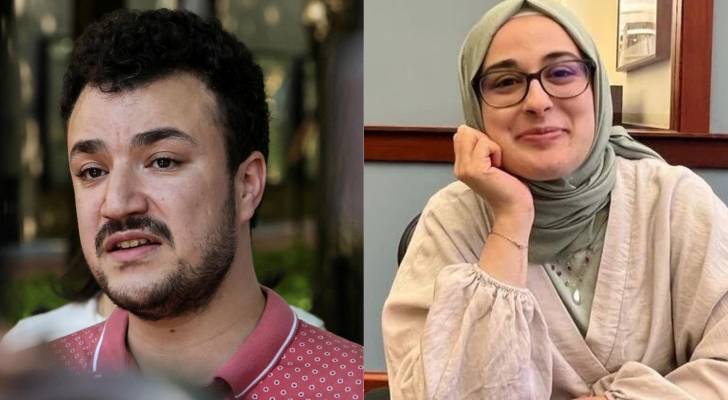Mahmoud Khalil (left), Rümeysa Öztürk (right)
Democratic lawmakers visit Mahmoud Khalil, Rümeysa Öztürk
A delegation of Democratic lawmakers traveled to Louisiana this week to meet two international graduate students currently held in US immigration detention.
The students, Mahmoud Khalil and Rümeysa Öztürk, were arrested in March following their participation in pro-Palestinian demonstrations on university campuses and are now facing deportation.
Read more: Trump administration detains Turkish student over pro-Palestinian activism
Khalil, a former graduate student at Columbia University, and Öztürk, a Turkish PhD candidate at Tufts University, are being held at two separate Immigration and Customs Enforcement (ICE) facilities. Both were detained as part of what the Trump administration describes as a broader effort to curb anti-Semitism on US campuses — a policy critics say is being used to suppress political dissent.
The congressional delegation included Reps. Cleo Fields and Troy Carter of Louisiana, Bennie Thompson of Mississippi, Ayanna Pressley of Massachusetts, and Sen. Edward J. Markey, also of Massachusetts. After meeting with the students, Rep. Carter told reporters, "We stand firm with them, in support of free speech," adding that while the facilities appeared clean, detainees voiced concerns over persistently cold temperatures.
Sen. Markey emphasized that neither Khalil nor Öztürk has been charged with a crime. He criticized the administration’s decision to hold them in Louisiana, saying it was an attempt to "circumscribe the constitutional rights of Rümeysa Öztürk and Mahmoud Khalil."
Markey also raised concerns about Öztürk’s health, noting she has experienced several asthma attacks in detention and "is not getting the medical attention which [she] need[s] and deserve[s]."
Khalil, 30, has been held since March 8, when he was informed by ICE officials that he was being deported due to his role in anti-war protests. He had served as a student negotiator during pro-Palestinian demonstrations at Columbia in 2024. A Louisiana judge upheld the deportation move, citing a 1952 law that allows for the removal of individuals deemed detrimental to US foreign policy.
In an open letter, Khalil criticized the move, stating the US has become "a democracy of convenience" where rights are granted only to those "who align with power." His legal team continues to push for bail and a preliminary injunction that would allow him to be released.
Khalil's wife, Noor Abdalla, gave birth to their first child on Monday. ICE denied Khalil’s request for temporary release to attend the birth. “This was a purposeful decision by ICE to make me, Mahmoud, and our son suffer,” Abdalla said.
Read more: Palestinian activist Mahmoud Khalil denied release for son’s birth
Öztürk was arrested by plainclothes agents near Boston on March 25 while walking to an iftar meal during Ramadan. Her legal status in the US was valid at the time of her arrest. A federal court in Vermont ruled last week that her case should continue there and ordered her transfer back to a Vermont facility by May 1. A bail hearing is scheduled for May 9.
Lawyers for both students argue that detaining them in Louisiana is a strategic move meant to isolate them from their support networks and place their cases before more favorable courts. A statement issued Tuesday by the visiting lawmakers accused the administration of “ripping individuals from their communities and shipping them to jurisdictions more favorable to the Trump administration’s deportation agenda.”
They further claimed that the justification for moving Öztürk — a supposed lack of space in her home state — was a cover for “an attempt to hand-pick the courts that will decide her case.”
The delegation is now demanding answers from Homeland Security Secretary Kristi Noem and acting ICE Director Todd Lyons regarding the students’ treatment and the decisions surrounding their detentions.




